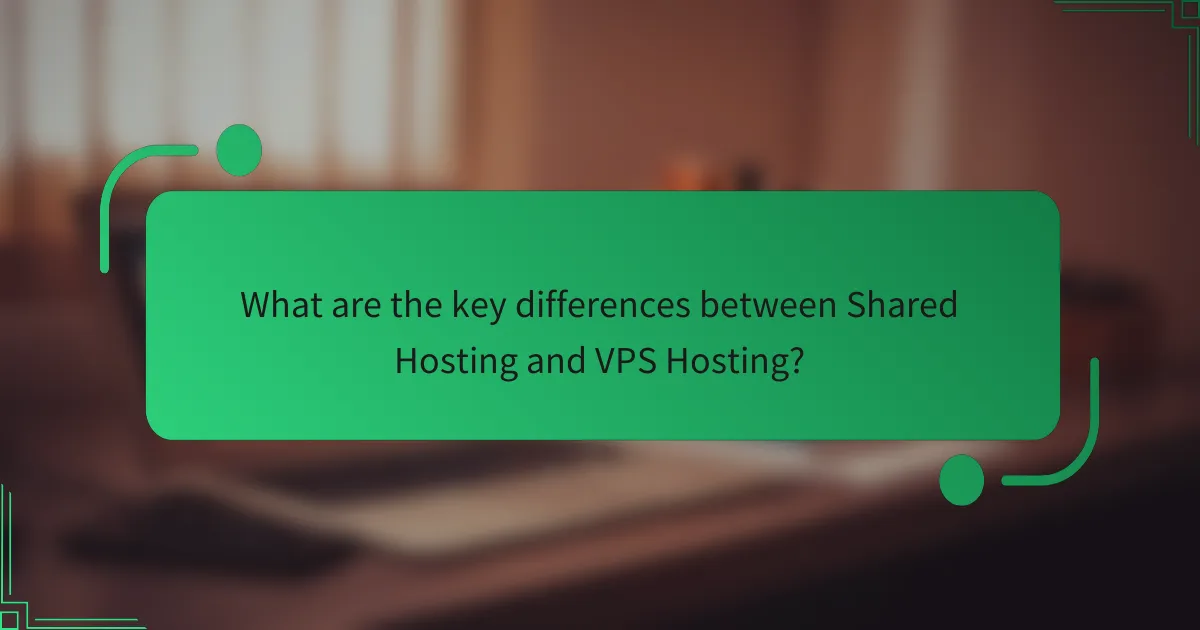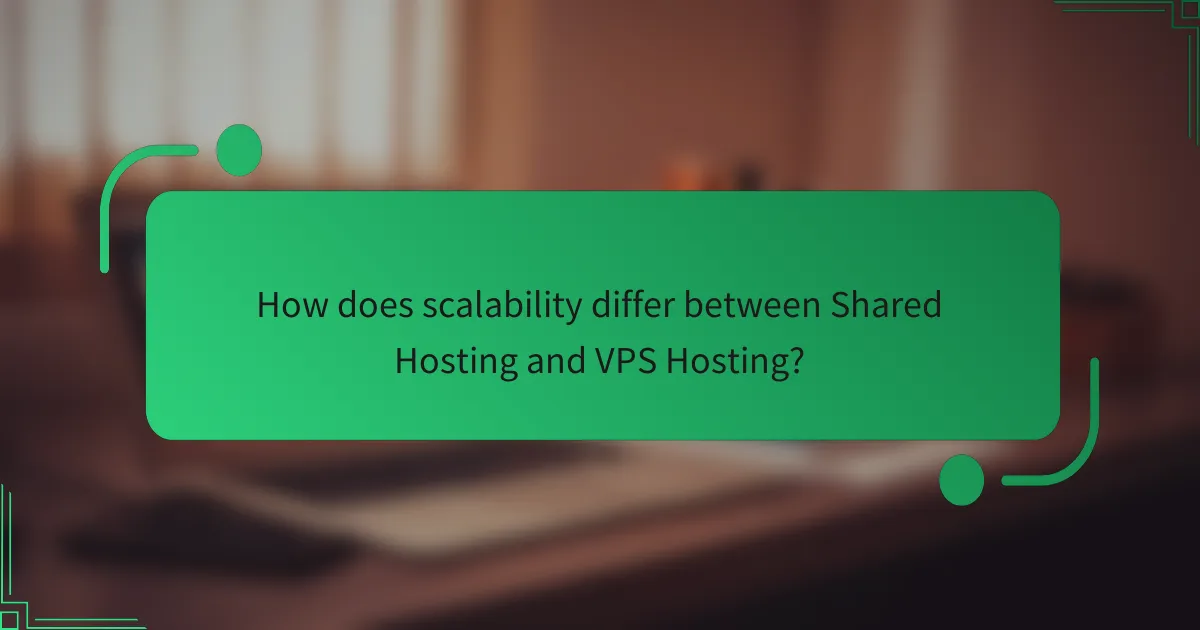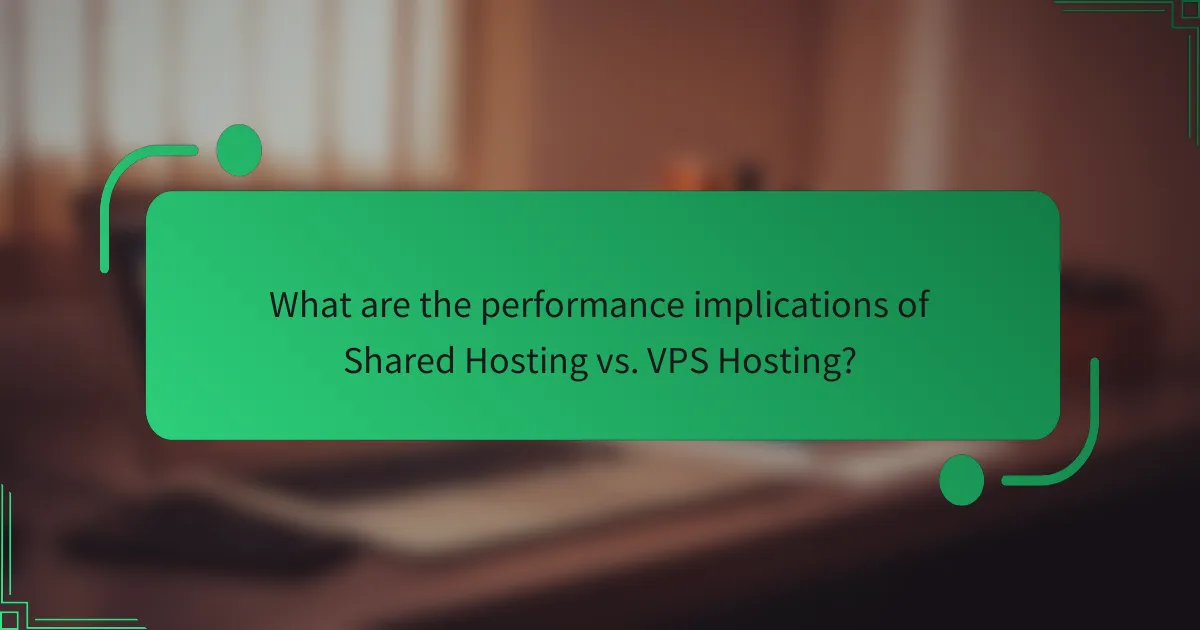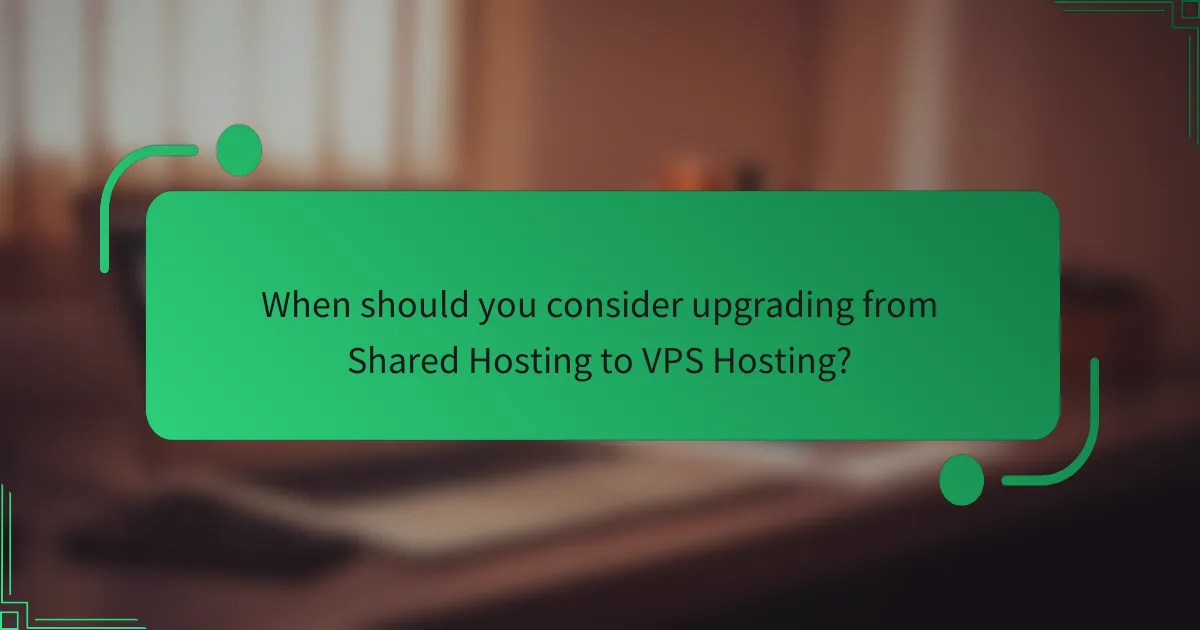When choosing between shared hosting and VPS hosting, it’s essential to understand their key differences in resource allocation, performance, and scalability. Shared hosting is a budget-friendly option where multiple users share server resources, while VPS hosting offers dedicated resources for enhanced control and performance. For small businesses in the UK, the decision hinges on specific needs such as budget, expected traffic, and technical requirements.

What are the key differences between Shared Hosting and VPS Hosting?
Shared hosting and VPS hosting differ primarily in resource allocation, performance, and scalability. Shared hosting involves multiple users sharing a single server’s resources, while VPS hosting provides dedicated resources on a virtual private server, offering greater control and performance.
Resource allocation
In shared hosting, resources such as CPU, RAM, and bandwidth are distributed among all users on the server. This can lead to performance issues if one site experiences high traffic. In contrast, VPS hosting allocates specific resources to each user, ensuring that your website’s performance is not affected by others.
For example, a shared hosting plan might offer 1 GB of RAM shared among dozens of sites, while a VPS plan could provide 2 GB of dedicated RAM for a single user. This distinction is crucial for businesses expecting growth or high traffic.
Performance metrics
Performance in shared hosting can be unpredictable, as it relies on the overall server load. Websites may experience slower load times during peak hours due to resource contention. VPS hosting, however, typically delivers more consistent performance with faster load times and improved reliability, as users have guaranteed resources.
Common performance metrics to consider include server response time and uptime. VPS hosting often achieves uptime rates above 99.9%, while shared hosting may fall short during high-traffic periods.
Cost comparison
Shared hosting is generally more affordable, with plans starting at low monthly rates, making it suitable for small websites or personal projects. VPS hosting, while more expensive, offers better value for growing businesses that require enhanced performance and reliability.
For example, shared hosting can cost between £2 to £10 per month, whereas VPS hosting typically ranges from £15 to £50 per month, depending on the resources allocated. Investing in VPS hosting can lead to long-term savings by reducing downtime and improving user experience.

Which hosting option is better for small businesses in the UK?
For small businesses in the UK, shared hosting is often the more cost-effective option, while VPS hosting offers greater performance and scalability. The choice depends on the specific needs of the business, including budget, expected traffic, and technical requirements.
Shared Hosting benefits
Shared hosting is typically the most affordable option, making it ideal for small businesses with limited budgets. It allows multiple websites to share the same server resources, which keeps costs down while providing essential features like email accounts and basic website management tools.
Another advantage is ease of use; shared hosting often comes with user-friendly control panels that simplify website management. This is particularly beneficial for business owners who may not have extensive technical expertise.
VPS Hosting advantages
VPS hosting provides dedicated resources, which means better performance and reliability compared to shared hosting. This is crucial for businesses expecting higher traffic or those running resource-intensive applications, as it can significantly reduce loading times and downtime.
Additionally, VPS hosting offers greater scalability. Businesses can easily upgrade their resources as they grow, ensuring that their hosting solution can adapt to increasing demands without a complete overhaul. This flexibility is essential for businesses looking to expand their online presence.

How does scalability differ between Shared Hosting and VPS Hosting?
Scalability in Shared Hosting and VPS Hosting varies significantly, impacting how easily you can adjust resources as your website grows. Shared Hosting typically offers limited scalability due to resource sharing, while VPS Hosting provides greater flexibility and control, allowing for more substantial upgrades as needed.
Scalability in Shared Hosting
In Shared Hosting, multiple websites share the same server resources, which restricts scalability. When traffic increases, you may experience slowdowns or downtime since the server’s capacity is divided among all users. Upgrading often means moving to a different plan or provider, which can be a cumbersome process.
Most Shared Hosting plans offer basic resource limits, such as bandwidth and storage, which can be sufficient for small websites. However, if your site starts to attract more visitors, you might quickly reach these limits, necessitating a switch to a more robust hosting option.
Scalability in VPS Hosting
VPS Hosting provides a virtualised server environment, allowing for much better scalability compared to Shared Hosting. Users have dedicated resources, meaning that as your website grows, you can easily upgrade your CPU, RAM, or storage without significant downtime. This flexibility is ideal for businesses expecting fluctuating traffic levels.
Many VPS providers offer scalable plans where you can adjust resources on-the-fly, often through a user-friendly dashboard. This means you can respond to increased demand quickly, ensuring your website remains performant during peak times.

What are the performance implications of Shared Hosting vs. VPS Hosting?
The performance implications of Shared Hosting compared to VPS Hosting are significant. Shared Hosting often leads to slower load times and less reliability due to resource sharing, while VPS Hosting provides dedicated resources that enhance speed and uptime.
Uptime statistics
Uptime is a critical performance metric, especially for businesses. Shared Hosting typically offers uptime rates around 99-99.5%, which may be affected by other users on the same server. In contrast, VPS Hosting can achieve uptime rates of 99.9% or higher, thanks to dedicated resources and better server management.
When choosing a hosting option, consider the potential impact of downtime on your business. For example, even a few hours of downtime in a month can lead to lost revenue and customer trust.
Load handling capabilities
Load handling capabilities differ greatly between Shared and VPS Hosting. Shared Hosting can struggle with high traffic volumes, as resources are limited and shared among multiple users. This can result in slow response times during peak usage.
On the other hand, VPS Hosting allows for greater scalability and can handle increased traffic more effectively. With dedicated CPU and RAM, a VPS can manage sudden spikes in visitors without compromising performance, making it a better choice for growing websites.

What are the security features of Shared Hosting and VPS Hosting?
Shared hosting typically offers basic security features, while VPS hosting provides enhanced security measures due to its dedicated resources. Understanding the differences in security can help you choose the right hosting solution for your needs.
Security in Shared Hosting
In shared hosting, multiple websites share the same server resources, which can lead to security vulnerabilities. If one site is compromised, others on the same server may also be at risk. Basic security features often include firewalls, malware scanning, and regular backups, but these may not be sufficient for sensitive data.
Users should be cautious when selecting shared hosting providers. Look for those that offer SSL certificates, DDoS protection, and regular security updates. It’s also wise to use strong passwords and enable two-factor authentication where possible.
Security in VPS Hosting
VPS hosting provides a more secure environment as each virtual server operates independently. This isolation means that if one VPS is attacked, others remain unaffected. VPS plans often include advanced security features such as dedicated firewalls, intrusion detection systems, and custom security configurations.
When choosing VPS hosting, consider providers that offer managed security services, regular security audits, and automatic updates. This proactive approach can significantly reduce the risk of breaches and ensure that your data remains protected. Additionally, having root access allows for greater control over security settings and software installations.

When should you consider upgrading from Shared Hosting to VPS Hosting?
Upgrading from shared hosting to VPS hosting is advisable when your website outgrows the limitations of shared resources. If you experience increased traffic, require better performance, or need more control over your server environment, a VPS can provide the necessary resources and flexibility.
Signs of needing more resources
Common signs that you need more resources include frequent slowdowns, increased downtime, or limitations on the number of websites you can host. If your website is growing and you find yourself hitting bandwidth limits or storage capacity, it’s time to consider a VPS.
Another indicator is the need for specific software or configurations that shared hosting cannot support. If you require custom software installations or specific server settings, a VPS allows for greater customisation and control.
Performance degradation indicators
Performance degradation can manifest as slow loading times, especially during peak traffic periods. If your website takes longer than a few seconds to load, it may be time to evaluate your hosting solution. A VPS can provide dedicated resources that improve speed and reliability.
Additionally, if users report issues accessing your site or if you receive alerts about server performance, these are clear signs that shared hosting may no longer meet your needs. Upgrading to a VPS can help ensure a smoother experience for your visitors.

What are the costs associated with Shared Hosting and VPS Hosting in the UK?
The costs of Shared Hosting and VPS Hosting in the UK vary significantly based on the level of resources and control required. Shared Hosting typically ranges from £2 to £10 per month, while VPS Hosting can start around £15 and go up to £100 or more monthly, depending on the specifications.
Shared Hosting Costs
Shared Hosting is generally the more economical option, making it ideal for small websites or blogs. Prices usually fall between £2 and £10 per month, depending on the provider and features included, such as storage, bandwidth, and customer support.
While the low cost is appealing, users share server resources with other websites, which can lead to slower performance during peak times. It’s essential to consider the trade-off between cost and the potential for limited performance and scalability.
VPS Hosting Costs
VPS Hosting offers more resources and greater control, with costs typically ranging from £15 to £100 per month. This price variation is influenced by factors such as the amount of RAM, CPU power, and storage space allocated to the virtual server.
Although VPS Hosting is more expensive, it provides better performance and scalability, making it suitable for growing businesses or websites with higher traffic. Users should assess their needs carefully to determine if the investment aligns with their goals.
Cost Considerations
When choosing between Shared and VPS Hosting, consider not only the monthly fees but also the potential for additional costs. For instance, VPS Hosting may require more technical expertise, which could lead to expenses for managed services or support.
Additionally, evaluate the long-term value. While Shared Hosting may save money initially, if your website grows, you might need to upgrade to VPS Hosting sooner than expected, incurring higher costs in the long run. Always factor in future scalability when making your decision.